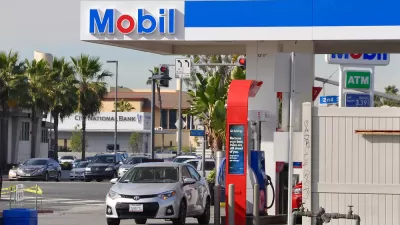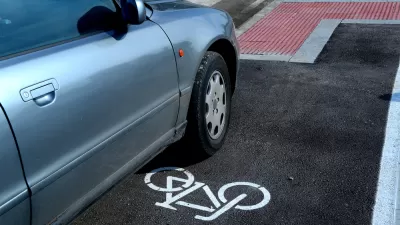While state legislatures and governors are struggling whether to raise state gas, sales, or income taxes or user fees to fund transportation projects, an arcane state board of five elected members voted 3-2 to increase CA's gas tax by 3.5 cents.
Add California to the short list of states that have chosen to ask drivers - rather than the general public or Prius or Leaf drivers, to pay a small increase in the gas tax to fund transportation programs.
As small as it may be, it may be enough to give the state the highest 'total' state gas tax when sales taxes are considered come July 1, according to the Associated Press. [See the Tax Foundation's State Gasoline Tax Rates effective Jan. 1, 2013. New York is #1 at $.506; CA at $.487]
While Virginia Governor Bob McDonnell is expected to make history this month by making his state the first to have no state gas excise (per-gallon) tax, opting to increase the general sales tax, charge a 3.5 percent wholesale tax on motor fuels and "double the registration fee on electric cars to $100 and applying it to alternative fuel and hybrid vehicles", some states are sticking to the traditional user fee known as the gas tax.
While it may be difficult to top the 10-cent gas tax increase signed by Wyoming Gov. Matt Mead on Feb. 15 - effective July 1, others may settle for smaller increases - like the 3.5-cent increase approved in California on March 1, also effective July 1.
But unlike Wyoming or Virginia, this gas tax increase did not go through a lengthy legislative process involving state lawmakers and the governor, potentially subject to supermajority thresholds as is the case in California, with elected leaders possibly concerned about the Taxpayer Protection Pledge (by Grover Norquist) they may have signed. Ron D. White explains.
Because of a complicated 2010 law, the (five-member California Board of Equalization) is required to make up for the (6)% in statewide sales tax revenue that was exempted when that law went into effect.
White is referring to what Kathleen Pender of the San Francisco Chronicle calls "a convoluted system for setting gasoline taxes in 2010 as a way to help fill a hole in the general fund that year." Pender writes:
The legislation lowered the sales tax rate on gasoline to 2.25 from 8.25 percent and raised the excise tax rate to 35.3 cents from 18 cents per gallon starting July 1, 2010. It required this so-called fuel tax swap to be revenue neutral, meaning the tax revenue generated by the two taxes combined should not change as a result of the swap. The legislation required the board to adjust the excise tax by March 1 each year to achieve revenue neutrality, with the change taking effect July 1.
White writes that the "five-member California Board of Equalization is an elected body whose members serve four-year terms. They are rarely in the news. The board voted 3 to 2 (March 1 as required by state law) for the excise tax rise. It could have chosen a smaller amount."
Bottom line: When the legislature in 2010 assigned fuel taxes to be adjusted in this manner, convoluted as it may be, it allowed a rather unknown, though elected statewide board to make these critical decisions.
While business reporters White and Pender picked up on the increase as did the Sacramento Bee and editorial board of The Desert Sun, the moderate tax increase was not subject to the media attention on a protracted legislative battle with heated debate would undoubtedly have received, similar to what happened in Virginia, Wyoming, Wisconsin and other states that are considering increasing transportation revenue.
Of course - that is not a fail-safe method for adjusting the gas tax, as was shown in Wisconsin when the legislature in 2006 voted to end the annual indexing (PDF) of the gas tax to the Consumer Price Index that had been done since 1985.
FULL STORY: Get ready for likely gas price increase when California taxes go up

Alabama: Trump Terminates Settlements for Black Communities Harmed By Raw Sewage
Trump deemed the landmark civil rights agreement “illegal DEI and environmental justice policy.”

Study: Maui’s Plan to Convert Vacation Rentals to Long-Term Housing Could Cause Nearly $1 Billion Economic Loss
The plan would reduce visitor accommodation by 25% resulting in 1,900 jobs lost.

Why Should We Subsidize Public Transportation?
Many public transit agencies face financial stress due to rising costs, declining fare revenue, and declining subsidies. Transit advocates must provide a strong business case for increasing public transit funding.

Paris Bike Boom Leads to Steep Drop in Air Pollution
The French city’s air quality has improved dramatically in the past 20 years, coinciding with a growth in cycling.

Why Housing Costs More to Build in California Than in Texas
Hard costs like labor and materials combined with ‘soft’ costs such as permitting make building in the San Francisco Bay Area almost three times as costly as in Texas cities.

San Diego County Sees a Rise in Urban Coyotes
San Diego County experiences a rise in urban coyotes, as sightings become prevalent throughout its urban neighbourhoods and surrounding areas.
Urban Design for Planners 1: Software Tools
This six-course series explores essential urban design concepts using open source software and equips planners with the tools they need to participate fully in the urban design process.
Planning for Universal Design
Learn the tools for implementing Universal Design in planning regulations.
Smith Gee Studio
Alamo Area Metropolitan Planning Organization
City of Santa Clarita
Institute for Housing and Urban Development Studies (IHS)
City of Grandview
Harvard GSD Executive Education
Toledo-Lucas County Plan Commissions
Salt Lake City
NYU Wagner Graduate School of Public Service





























